Hospitality Management and Service Delivery Report: Caenshill Hotel
VerifiedAdded on 2023/01/17
|14
|3909
|100
Report
AI Summary
This report delves into the operational management and service delivery of Caenshill Hotel, a three-star establishment in the United Kingdom facing challenges related to customer satisfaction. The report begins with an introduction to hospitality management and service delivery, emphasizing their importance in the industry. It then provides an overview of the hotel's situation, highlighting issues such as inconsistent services and slow food delivery. The main body of the report examines key elements of operational management in hospitality, tourism, and events, including front desk services, housekeeping, food and beverage, and event planning. It also discusses challenges like changing customer expectations, technological advancements, and labor shortages. The report explores service encounters, differentiating between tangible and intangible elements, and reviews relevant management theories such as administrative and bureaucratic management. Finally, it compares standard operating procedures across different departments and concludes with recommendations for improvement and a discussion of staff performance and communication.
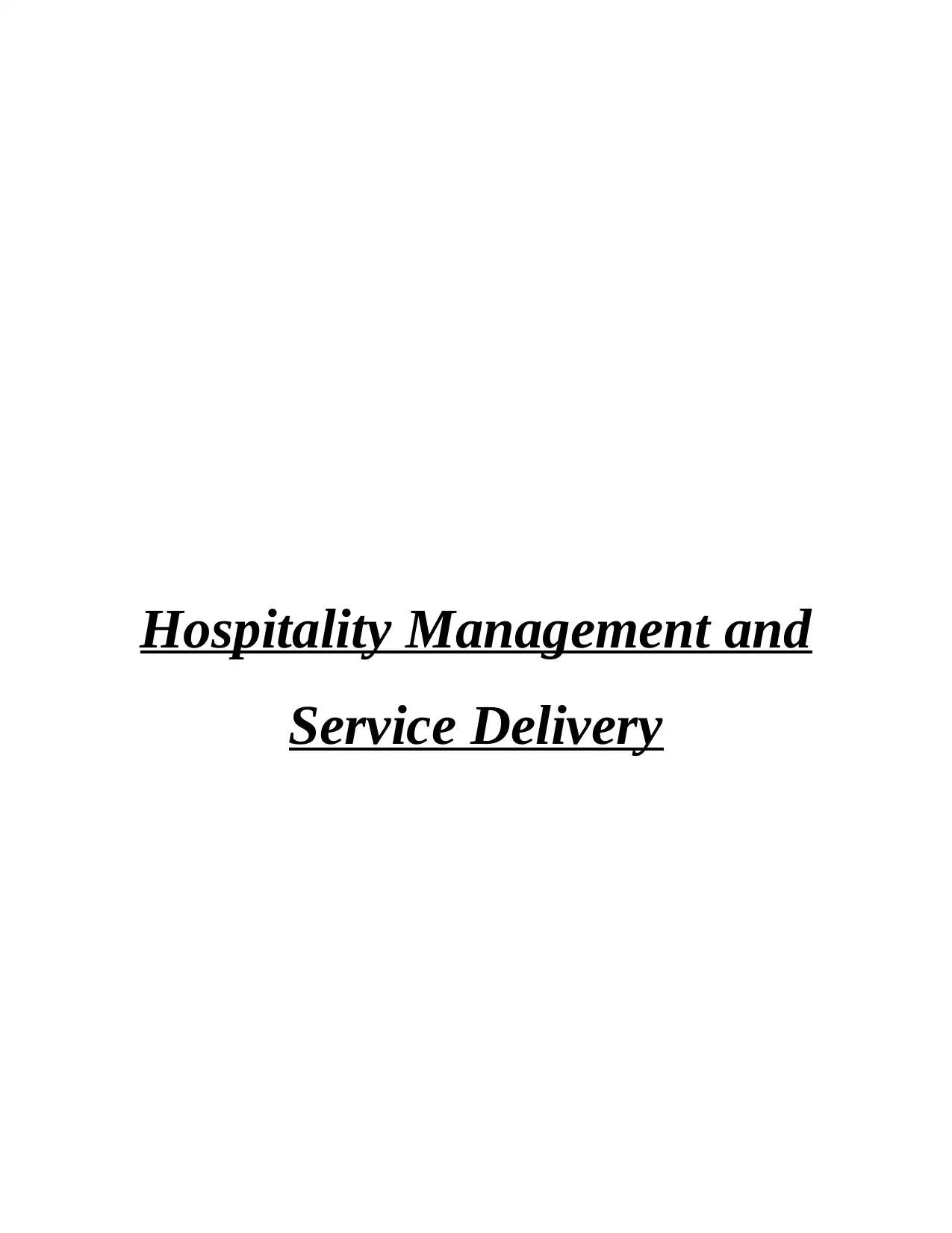
Hospitality Management and
Service Delivery
Service Delivery
Paraphrase This Document
Need a fresh take? Get an instant paraphrase of this document with our AI Paraphraser
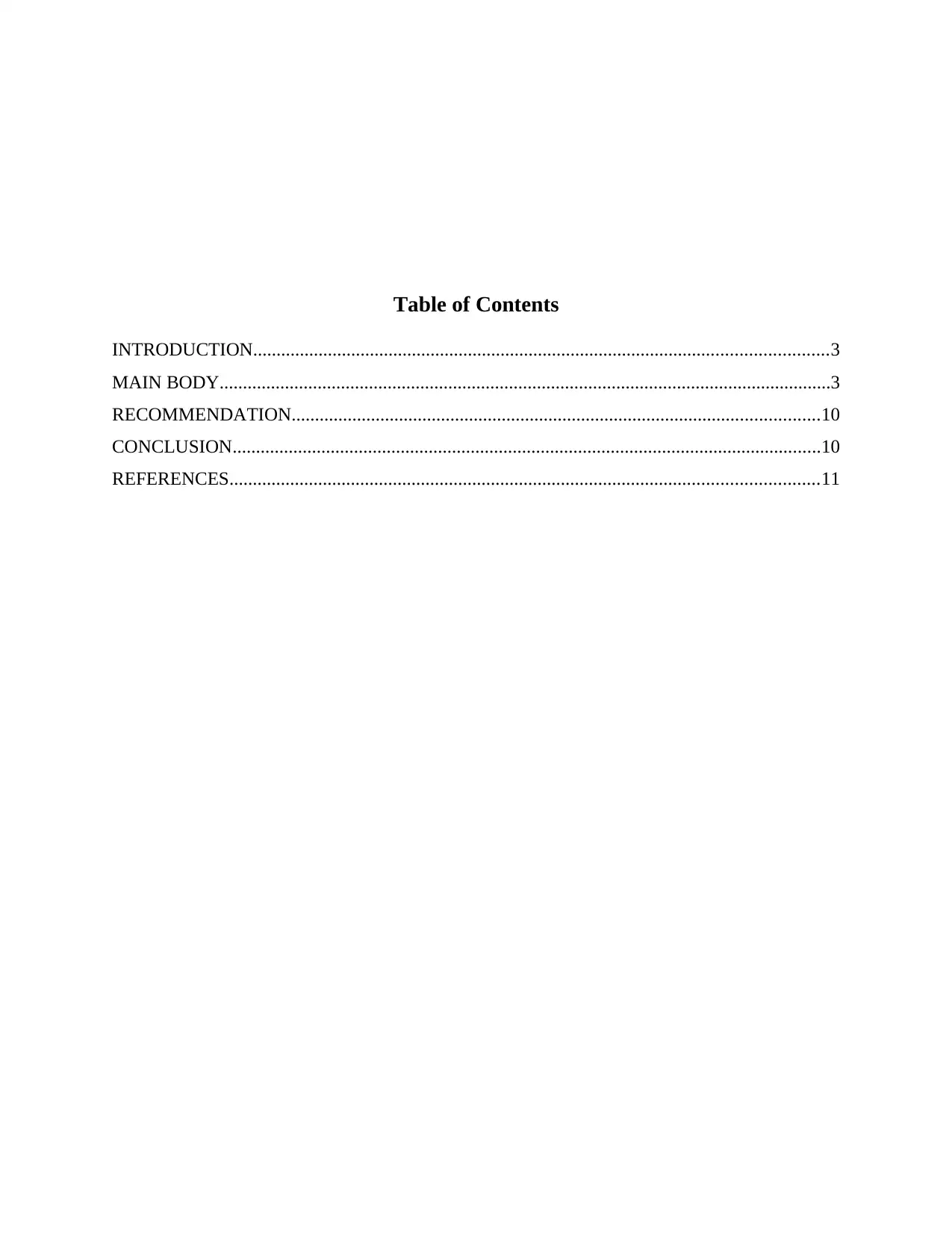
Table of Contents
INTRODUCTION...........................................................................................................................3
MAIN BODY...................................................................................................................................3
RECOMMENDATION.................................................................................................................10
CONCLUSION..............................................................................................................................10
REFERENCES..............................................................................................................................11
INTRODUCTION...........................................................................................................................3
MAIN BODY...................................................................................................................................3
RECOMMENDATION.................................................................................................................10
CONCLUSION..............................................................................................................................10
REFERENCES..............................................................................................................................11
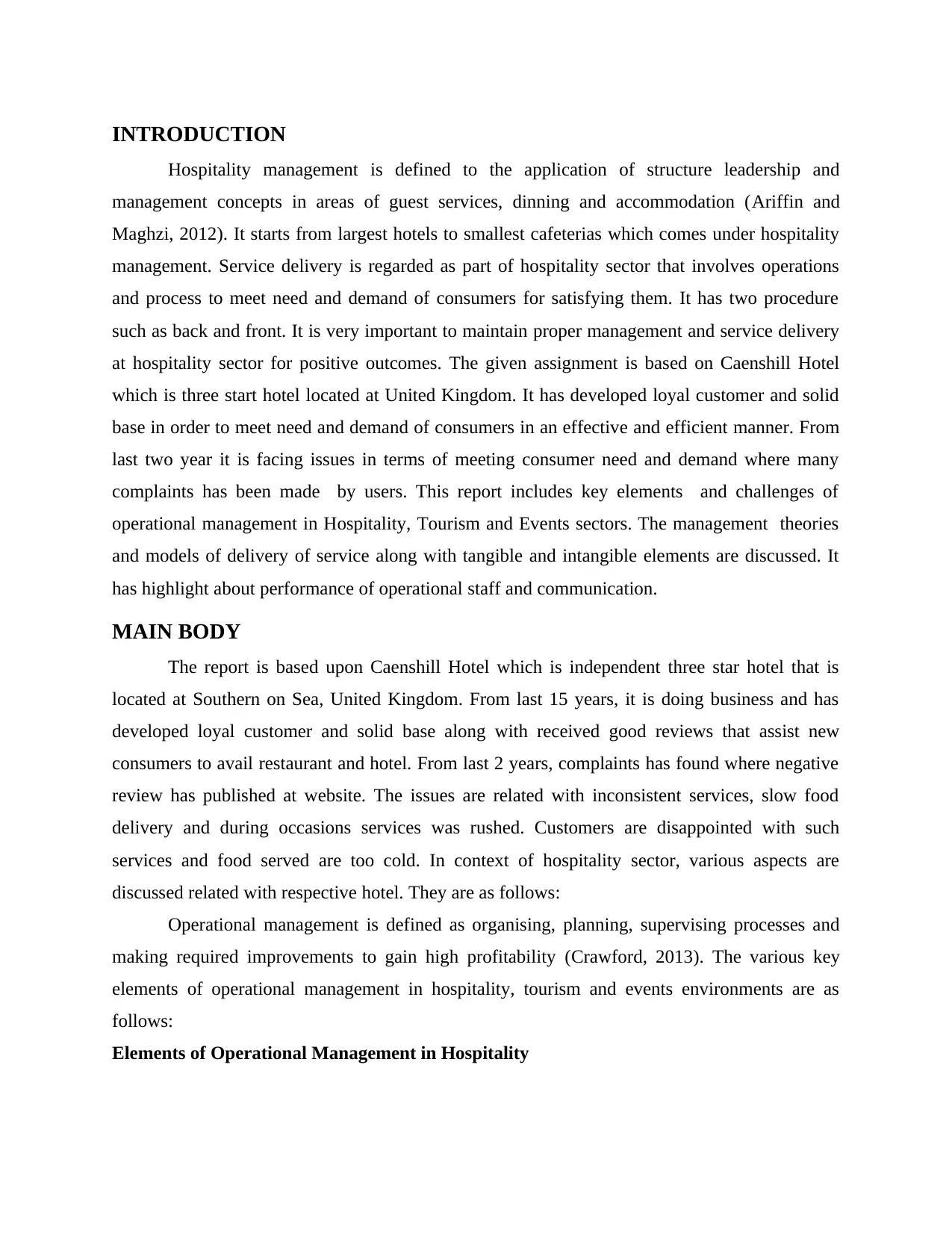
INTRODUCTION
Hospitality management is defined to the application of structure leadership and
management concepts in areas of guest services, dinning and accommodation (Ariffin and
Maghzi, 2012). It starts from largest hotels to smallest cafeterias which comes under hospitality
management. Service delivery is regarded as part of hospitality sector that involves operations
and process to meet need and demand of consumers for satisfying them. It has two procedure
such as back and front. It is very important to maintain proper management and service delivery
at hospitality sector for positive outcomes. The given assignment is based on Caenshill Hotel
which is three start hotel located at United Kingdom. It has developed loyal customer and solid
base in order to meet need and demand of consumers in an effective and efficient manner. From
last two year it is facing issues in terms of meeting consumer need and demand where many
complaints has been made by users. This report includes key elements and challenges of
operational management in Hospitality, Tourism and Events sectors. The management theories
and models of delivery of service along with tangible and intangible elements are discussed. It
has highlight about performance of operational staff and communication.
MAIN BODY
The report is based upon Caenshill Hotel which is independent three star hotel that is
located at Southern on Sea, United Kingdom. From last 15 years, it is doing business and has
developed loyal customer and solid base along with received good reviews that assist new
consumers to avail restaurant and hotel. From last 2 years, complaints has found where negative
review has published at website. The issues are related with inconsistent services, slow food
delivery and during occasions services was rushed. Customers are disappointed with such
services and food served are too cold. In context of hospitality sector, various aspects are
discussed related with respective hotel. They are as follows:
Operational management is defined as organising, planning, supervising processes and
making required improvements to gain high profitability (Crawford, 2013). The various key
elements of operational management in hospitality, tourism and events environments are as
follows:
Elements of Operational Management in Hospitality
Hospitality management is defined to the application of structure leadership and
management concepts in areas of guest services, dinning and accommodation (Ariffin and
Maghzi, 2012). It starts from largest hotels to smallest cafeterias which comes under hospitality
management. Service delivery is regarded as part of hospitality sector that involves operations
and process to meet need and demand of consumers for satisfying them. It has two procedure
such as back and front. It is very important to maintain proper management and service delivery
at hospitality sector for positive outcomes. The given assignment is based on Caenshill Hotel
which is three start hotel located at United Kingdom. It has developed loyal customer and solid
base in order to meet need and demand of consumers in an effective and efficient manner. From
last two year it is facing issues in terms of meeting consumer need and demand where many
complaints has been made by users. This report includes key elements and challenges of
operational management in Hospitality, Tourism and Events sectors. The management theories
and models of delivery of service along with tangible and intangible elements are discussed. It
has highlight about performance of operational staff and communication.
MAIN BODY
The report is based upon Caenshill Hotel which is independent three star hotel that is
located at Southern on Sea, United Kingdom. From last 15 years, it is doing business and has
developed loyal customer and solid base along with received good reviews that assist new
consumers to avail restaurant and hotel. From last 2 years, complaints has found where negative
review has published at website. The issues are related with inconsistent services, slow food
delivery and during occasions services was rushed. Customers are disappointed with such
services and food served are too cold. In context of hospitality sector, various aspects are
discussed related with respective hotel. They are as follows:
Operational management is defined as organising, planning, supervising processes and
making required improvements to gain high profitability (Crawford, 2013). The various key
elements of operational management in hospitality, tourism and events environments are as
follows:
Elements of Operational Management in Hospitality
⊘ This is a preview!⊘
Do you want full access?
Subscribe today to unlock all pages.

Trusted by 1+ million students worldwide
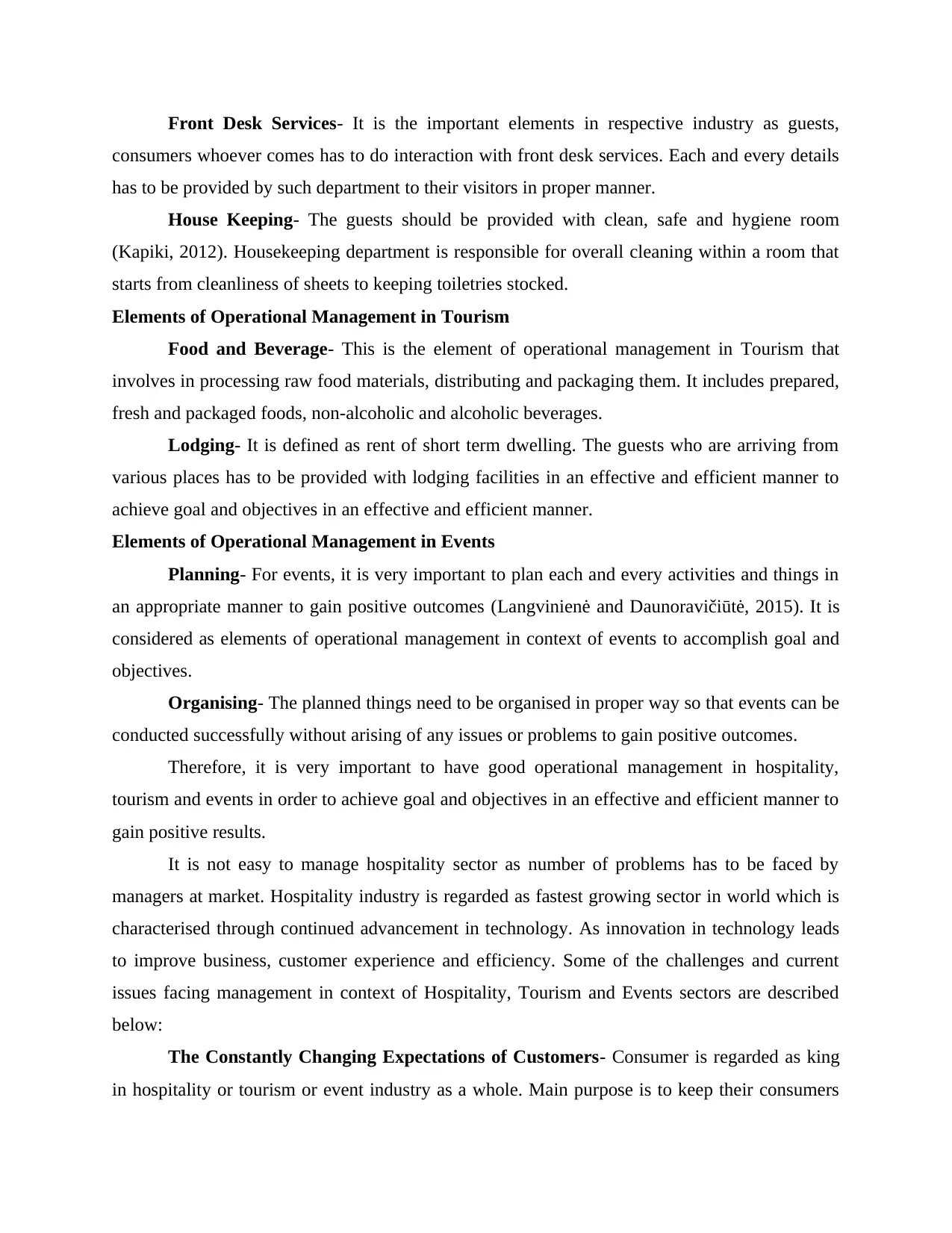
Front Desk Services- It is the important elements in respective industry as guests,
consumers whoever comes has to do interaction with front desk services. Each and every details
has to be provided by such department to their visitors in proper manner.
House Keeping- The guests should be provided with clean, safe and hygiene room
(Kapiki, 2012). Housekeeping department is responsible for overall cleaning within a room that
starts from cleanliness of sheets to keeping toiletries stocked.
Elements of Operational Management in Tourism
Food and Beverage- This is the element of operational management in Tourism that
involves in processing raw food materials, distributing and packaging them. It includes prepared,
fresh and packaged foods, non-alcoholic and alcoholic beverages.
Lodging- It is defined as rent of short term dwelling. The guests who are arriving from
various places has to be provided with lodging facilities in an effective and efficient manner to
achieve goal and objectives in an effective and efficient manner.
Elements of Operational Management in Events
Planning- For events, it is very important to plan each and every activities and things in
an appropriate manner to gain positive outcomes (Langvinienė and Daunoravičiūtė, 2015). It is
considered as elements of operational management in context of events to accomplish goal and
objectives.
Organising- The planned things need to be organised in proper way so that events can be
conducted successfully without arising of any issues or problems to gain positive outcomes.
Therefore, it is very important to have good operational management in hospitality,
tourism and events in order to achieve goal and objectives in an effective and efficient manner to
gain positive results.
It is not easy to manage hospitality sector as number of problems has to be faced by
managers at market. Hospitality industry is regarded as fastest growing sector in world which is
characterised through continued advancement in technology. As innovation in technology leads
to improve business, customer experience and efficiency. Some of the challenges and current
issues facing management in context of Hospitality, Tourism and Events sectors are described
below:
The Constantly Changing Expectations of Customers- Consumer is regarded as king
in hospitality or tourism or event industry as a whole. Main purpose is to keep their consumers
consumers whoever comes has to do interaction with front desk services. Each and every details
has to be provided by such department to their visitors in proper manner.
House Keeping- The guests should be provided with clean, safe and hygiene room
(Kapiki, 2012). Housekeeping department is responsible for overall cleaning within a room that
starts from cleanliness of sheets to keeping toiletries stocked.
Elements of Operational Management in Tourism
Food and Beverage- This is the element of operational management in Tourism that
involves in processing raw food materials, distributing and packaging them. It includes prepared,
fresh and packaged foods, non-alcoholic and alcoholic beverages.
Lodging- It is defined as rent of short term dwelling. The guests who are arriving from
various places has to be provided with lodging facilities in an effective and efficient manner to
achieve goal and objectives in an effective and efficient manner.
Elements of Operational Management in Events
Planning- For events, it is very important to plan each and every activities and things in
an appropriate manner to gain positive outcomes (Langvinienė and Daunoravičiūtė, 2015). It is
considered as elements of operational management in context of events to accomplish goal and
objectives.
Organising- The planned things need to be organised in proper way so that events can be
conducted successfully without arising of any issues or problems to gain positive outcomes.
Therefore, it is very important to have good operational management in hospitality,
tourism and events in order to achieve goal and objectives in an effective and efficient manner to
gain positive results.
It is not easy to manage hospitality sector as number of problems has to be faced by
managers at market. Hospitality industry is regarded as fastest growing sector in world which is
characterised through continued advancement in technology. As innovation in technology leads
to improve business, customer experience and efficiency. Some of the challenges and current
issues facing management in context of Hospitality, Tourism and Events sectors are described
below:
The Constantly Changing Expectations of Customers- Consumer is regarded as king
in hospitality or tourism or event industry as a whole. Main purpose is to keep their consumers
Paraphrase This Document
Need a fresh take? Get an instant paraphrase of this document with our AI Paraphraser
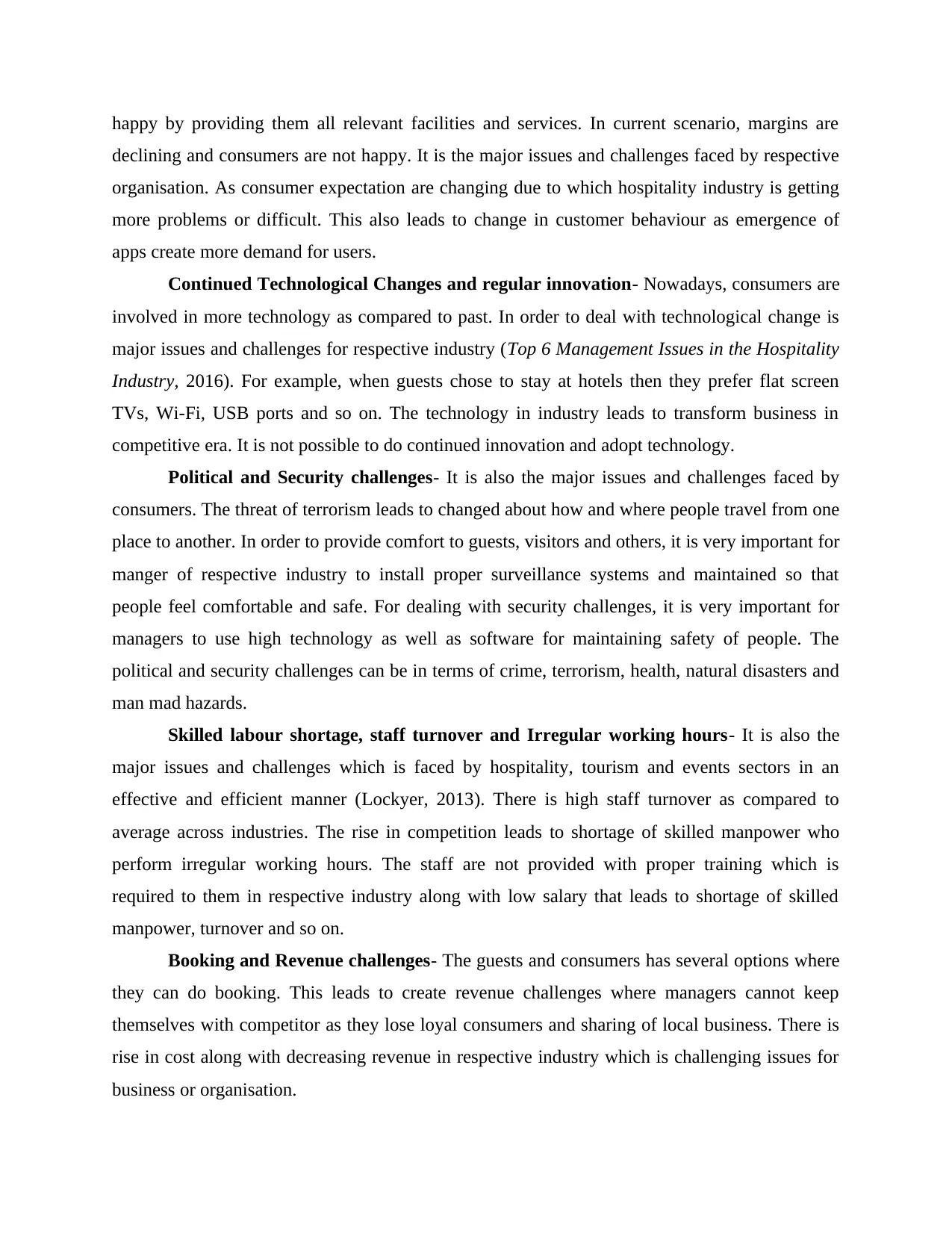
happy by providing them all relevant facilities and services. In current scenario, margins are
declining and consumers are not happy. It is the major issues and challenges faced by respective
organisation. As consumer expectation are changing due to which hospitality industry is getting
more problems or difficult. This also leads to change in customer behaviour as emergence of
apps create more demand for users.
Continued Technological Changes and regular innovation- Nowadays, consumers are
involved in more technology as compared to past. In order to deal with technological change is
major issues and challenges for respective industry (Top 6 Management Issues in the Hospitality
Industry, 2016). For example, when guests chose to stay at hotels then they prefer flat screen
TVs, Wi-Fi, USB ports and so on. The technology in industry leads to transform business in
competitive era. It is not possible to do continued innovation and adopt technology.
Political and Security challenges- It is also the major issues and challenges faced by
consumers. The threat of terrorism leads to changed about how and where people travel from one
place to another. In order to provide comfort to guests, visitors and others, it is very important for
manger of respective industry to install proper surveillance systems and maintained so that
people feel comfortable and safe. For dealing with security challenges, it is very important for
managers to use high technology as well as software for maintaining safety of people. The
political and security challenges can be in terms of crime, terrorism, health, natural disasters and
man mad hazards.
Skilled labour shortage, staff turnover and Irregular working hours- It is also the
major issues and challenges which is faced by hospitality, tourism and events sectors in an
effective and efficient manner (Lockyer, 2013). There is high staff turnover as compared to
average across industries. The rise in competition leads to shortage of skilled manpower who
perform irregular working hours. The staff are not provided with proper training which is
required to them in respective industry along with low salary that leads to shortage of skilled
manpower, turnover and so on.
Booking and Revenue challenges- The guests and consumers has several options where
they can do booking. This leads to create revenue challenges where managers cannot keep
themselves with competitor as they lose loyal consumers and sharing of local business. There is
rise in cost along with decreasing revenue in respective industry which is challenging issues for
business or organisation.
declining and consumers are not happy. It is the major issues and challenges faced by respective
organisation. As consumer expectation are changing due to which hospitality industry is getting
more problems or difficult. This also leads to change in customer behaviour as emergence of
apps create more demand for users.
Continued Technological Changes and regular innovation- Nowadays, consumers are
involved in more technology as compared to past. In order to deal with technological change is
major issues and challenges for respective industry (Top 6 Management Issues in the Hospitality
Industry, 2016). For example, when guests chose to stay at hotels then they prefer flat screen
TVs, Wi-Fi, USB ports and so on. The technology in industry leads to transform business in
competitive era. It is not possible to do continued innovation and adopt technology.
Political and Security challenges- It is also the major issues and challenges faced by
consumers. The threat of terrorism leads to changed about how and where people travel from one
place to another. In order to provide comfort to guests, visitors and others, it is very important for
manger of respective industry to install proper surveillance systems and maintained so that
people feel comfortable and safe. For dealing with security challenges, it is very important for
managers to use high technology as well as software for maintaining safety of people. The
political and security challenges can be in terms of crime, terrorism, health, natural disasters and
man mad hazards.
Skilled labour shortage, staff turnover and Irregular working hours- It is also the
major issues and challenges which is faced by hospitality, tourism and events sectors in an
effective and efficient manner (Lockyer, 2013). There is high staff turnover as compared to
average across industries. The rise in competition leads to shortage of skilled manpower who
perform irregular working hours. The staff are not provided with proper training which is
required to them in respective industry along with low salary that leads to shortage of skilled
manpower, turnover and so on.
Booking and Revenue challenges- The guests and consumers has several options where
they can do booking. This leads to create revenue challenges where managers cannot keep
themselves with competitor as they lose loyal consumers and sharing of local business. There is
rise in cost along with decreasing revenue in respective industry which is challenging issues for
business or organisation.
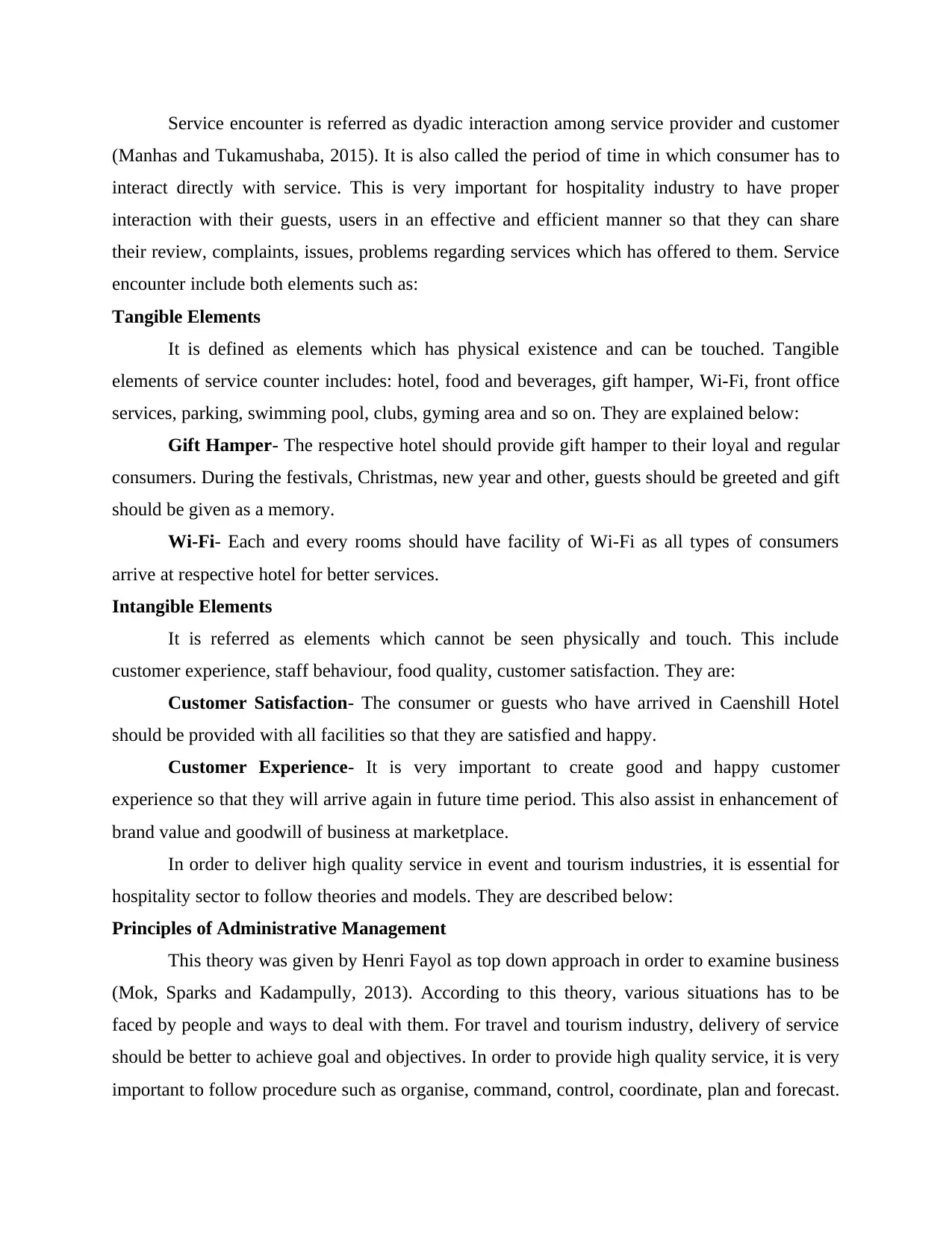
Service encounter is referred as dyadic interaction among service provider and customer
(Manhas and Tukamushaba, 2015). It is also called the period of time in which consumer has to
interact directly with service. This is very important for hospitality industry to have proper
interaction with their guests, users in an effective and efficient manner so that they can share
their review, complaints, issues, problems regarding services which has offered to them. Service
encounter include both elements such as:
Tangible Elements
It is defined as elements which has physical existence and can be touched. Tangible
elements of service counter includes: hotel, food and beverages, gift hamper, Wi-Fi, front office
services, parking, swimming pool, clubs, gyming area and so on. They are explained below:
Gift Hamper- The respective hotel should provide gift hamper to their loyal and regular
consumers. During the festivals, Christmas, new year and other, guests should be greeted and gift
should be given as a memory.
Wi-Fi- Each and every rooms should have facility of Wi-Fi as all types of consumers
arrive at respective hotel for better services.
Intangible Elements
It is referred as elements which cannot be seen physically and touch. This include
customer experience, staff behaviour, food quality, customer satisfaction. They are:
Customer Satisfaction- The consumer or guests who have arrived in Caenshill Hotel
should be provided with all facilities so that they are satisfied and happy.
Customer Experience- It is very important to create good and happy customer
experience so that they will arrive again in future time period. This also assist in enhancement of
brand value and goodwill of business at marketplace.
In order to deliver high quality service in event and tourism industries, it is essential for
hospitality sector to follow theories and models. They are described below:
Principles of Administrative Management
This theory was given by Henri Fayol as top down approach in order to examine business
(Mok, Sparks and Kadampully, 2013). According to this theory, various situations has to be
faced by people and ways to deal with them. For travel and tourism industry, delivery of service
should be better to achieve goal and objectives. In order to provide high quality service, it is very
important to follow procedure such as organise, command, control, coordinate, plan and forecast.
(Manhas and Tukamushaba, 2015). It is also called the period of time in which consumer has to
interact directly with service. This is very important for hospitality industry to have proper
interaction with their guests, users in an effective and efficient manner so that they can share
their review, complaints, issues, problems regarding services which has offered to them. Service
encounter include both elements such as:
Tangible Elements
It is defined as elements which has physical existence and can be touched. Tangible
elements of service counter includes: hotel, food and beverages, gift hamper, Wi-Fi, front office
services, parking, swimming pool, clubs, gyming area and so on. They are explained below:
Gift Hamper- The respective hotel should provide gift hamper to their loyal and regular
consumers. During the festivals, Christmas, new year and other, guests should be greeted and gift
should be given as a memory.
Wi-Fi- Each and every rooms should have facility of Wi-Fi as all types of consumers
arrive at respective hotel for better services.
Intangible Elements
It is referred as elements which cannot be seen physically and touch. This include
customer experience, staff behaviour, food quality, customer satisfaction. They are:
Customer Satisfaction- The consumer or guests who have arrived in Caenshill Hotel
should be provided with all facilities so that they are satisfied and happy.
Customer Experience- It is very important to create good and happy customer
experience so that they will arrive again in future time period. This also assist in enhancement of
brand value and goodwill of business at marketplace.
In order to deliver high quality service in event and tourism industries, it is essential for
hospitality sector to follow theories and models. They are described below:
Principles of Administrative Management
This theory was given by Henri Fayol as top down approach in order to examine business
(Mok, Sparks and Kadampully, 2013). According to this theory, various situations has to be
faced by people and ways to deal with them. For travel and tourism industry, delivery of service
should be better to achieve goal and objectives. In order to provide high quality service, it is very
important to follow procedure such as organise, command, control, coordinate, plan and forecast.
⊘ This is a preview!⊘
Do you want full access?
Subscribe today to unlock all pages.

Trusted by 1+ million students worldwide
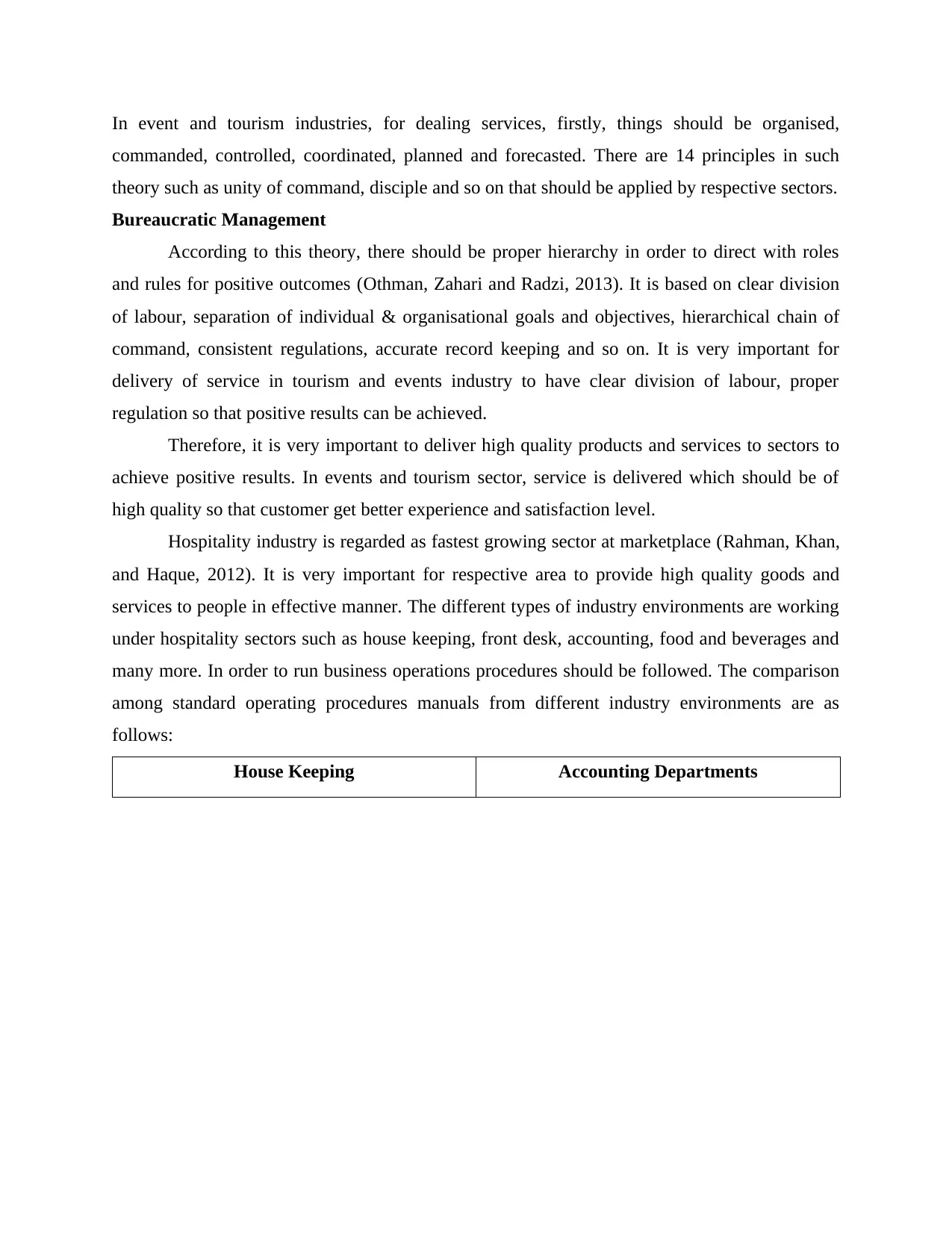
In event and tourism industries, for dealing services, firstly, things should be organised,
commanded, controlled, coordinated, planned and forecasted. There are 14 principles in such
theory such as unity of command, disciple and so on that should be applied by respective sectors.
Bureaucratic Management
According to this theory, there should be proper hierarchy in order to direct with roles
and rules for positive outcomes (Othman, Zahari and Radzi, 2013). It is based on clear division
of labour, separation of individual & organisational goals and objectives, hierarchical chain of
command, consistent regulations, accurate record keeping and so on. It is very important for
delivery of service in tourism and events industry to have clear division of labour, proper
regulation so that positive results can be achieved.
Therefore, it is very important to deliver high quality products and services to sectors to
achieve positive results. In events and tourism sector, service is delivered which should be of
high quality so that customer get better experience and satisfaction level.
Hospitality industry is regarded as fastest growing sector at marketplace (Rahman, Khan,
and Haque, 2012). It is very important for respective area to provide high quality goods and
services to people in effective manner. The different types of industry environments are working
under hospitality sectors such as house keeping, front desk, accounting, food and beverages and
many more. In order to run business operations procedures should be followed. The comparison
among standard operating procedures manuals from different industry environments are as
follows:
House Keeping Accounting Departments
commanded, controlled, coordinated, planned and forecasted. There are 14 principles in such
theory such as unity of command, disciple and so on that should be applied by respective sectors.
Bureaucratic Management
According to this theory, there should be proper hierarchy in order to direct with roles
and rules for positive outcomes (Othman, Zahari and Radzi, 2013). It is based on clear division
of labour, separation of individual & organisational goals and objectives, hierarchical chain of
command, consistent regulations, accurate record keeping and so on. It is very important for
delivery of service in tourism and events industry to have clear division of labour, proper
regulation so that positive results can be achieved.
Therefore, it is very important to deliver high quality products and services to sectors to
achieve positive results. In events and tourism sector, service is delivered which should be of
high quality so that customer get better experience and satisfaction level.
Hospitality industry is regarded as fastest growing sector at marketplace (Rahman, Khan,
and Haque, 2012). It is very important for respective area to provide high quality goods and
services to people in effective manner. The different types of industry environments are working
under hospitality sectors such as house keeping, front desk, accounting, food and beverages and
many more. In order to run business operations procedures should be followed. The comparison
among standard operating procedures manuals from different industry environments are as
follows:
House Keeping Accounting Departments
Paraphrase This Document
Need a fresh take? Get an instant paraphrase of this document with our AI Paraphraser
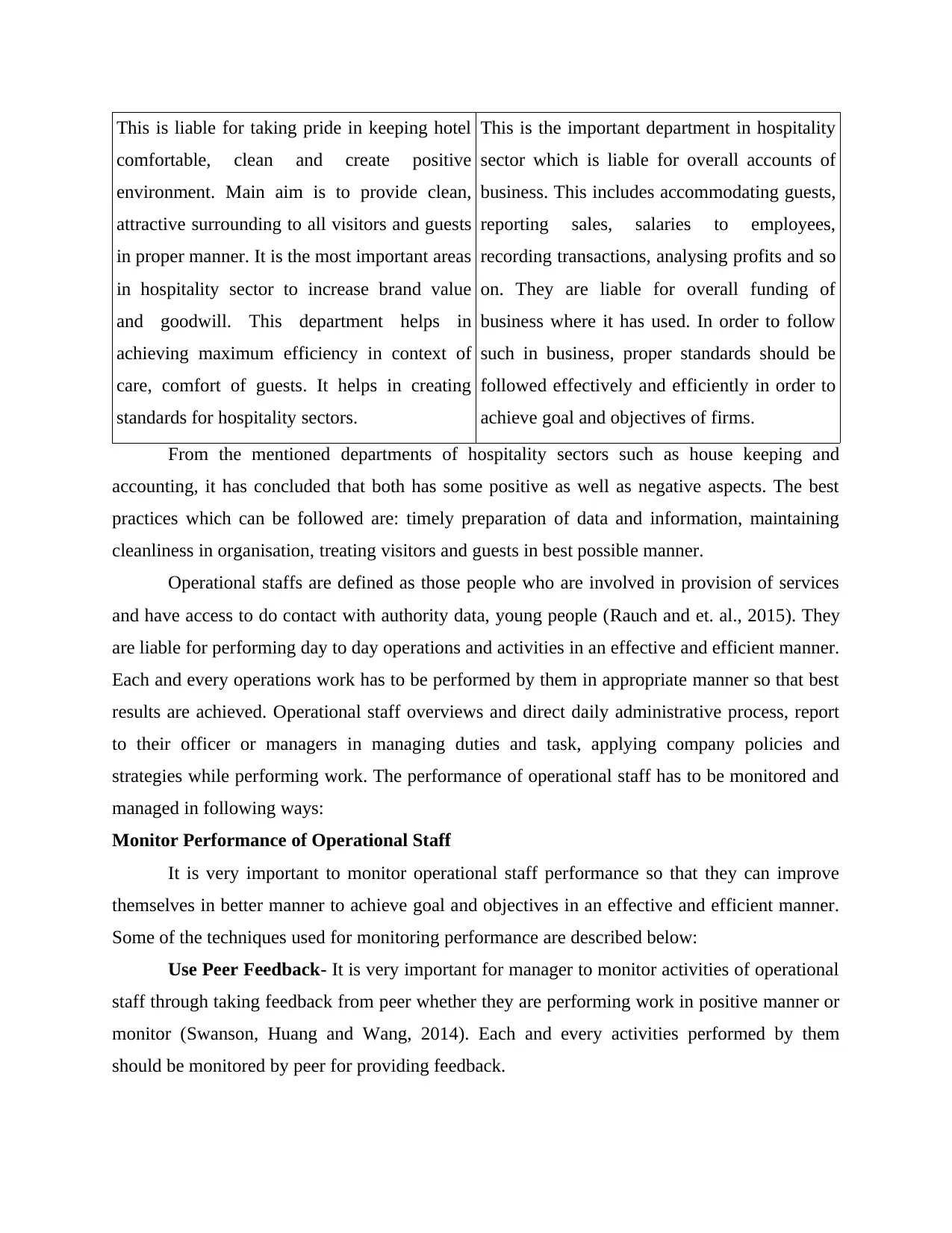
This is liable for taking pride in keeping hotel
comfortable, clean and create positive
environment. Main aim is to provide clean,
attractive surrounding to all visitors and guests
in proper manner. It is the most important areas
in hospitality sector to increase brand value
and goodwill. This department helps in
achieving maximum efficiency in context of
care, comfort of guests. It helps in creating
standards for hospitality sectors.
This is the important department in hospitality
sector which is liable for overall accounts of
business. This includes accommodating guests,
reporting sales, salaries to employees,
recording transactions, analysing profits and so
on. They are liable for overall funding of
business where it has used. In order to follow
such in business, proper standards should be
followed effectively and efficiently in order to
achieve goal and objectives of firms.
From the mentioned departments of hospitality sectors such as house keeping and
accounting, it has concluded that both has some positive as well as negative aspects. The best
practices which can be followed are: timely preparation of data and information, maintaining
cleanliness in organisation, treating visitors and guests in best possible manner.
Operational staffs are defined as those people who are involved in provision of services
and have access to do contact with authority data, young people (Rauch and et. al., 2015). They
are liable for performing day to day operations and activities in an effective and efficient manner.
Each and every operations work has to be performed by them in appropriate manner so that best
results are achieved. Operational staff overviews and direct daily administrative process, report
to their officer or managers in managing duties and task, applying company policies and
strategies while performing work. The performance of operational staff has to be monitored and
managed in following ways:
Monitor Performance of Operational Staff
It is very important to monitor operational staff performance so that they can improve
themselves in better manner to achieve goal and objectives in an effective and efficient manner.
Some of the techniques used for monitoring performance are described below:
Use Peer Feedback- It is very important for manager to monitor activities of operational
staff through taking feedback from peer whether they are performing work in positive manner or
monitor (Swanson, Huang and Wang, 2014). Each and every activities performed by them
should be monitored by peer for providing feedback.
comfortable, clean and create positive
environment. Main aim is to provide clean,
attractive surrounding to all visitors and guests
in proper manner. It is the most important areas
in hospitality sector to increase brand value
and goodwill. This department helps in
achieving maximum efficiency in context of
care, comfort of guests. It helps in creating
standards for hospitality sectors.
This is the important department in hospitality
sector which is liable for overall accounts of
business. This includes accommodating guests,
reporting sales, salaries to employees,
recording transactions, analysing profits and so
on. They are liable for overall funding of
business where it has used. In order to follow
such in business, proper standards should be
followed effectively and efficiently in order to
achieve goal and objectives of firms.
From the mentioned departments of hospitality sectors such as house keeping and
accounting, it has concluded that both has some positive as well as negative aspects. The best
practices which can be followed are: timely preparation of data and information, maintaining
cleanliness in organisation, treating visitors and guests in best possible manner.
Operational staffs are defined as those people who are involved in provision of services
and have access to do contact with authority data, young people (Rauch and et. al., 2015). They
are liable for performing day to day operations and activities in an effective and efficient manner.
Each and every operations work has to be performed by them in appropriate manner so that best
results are achieved. Operational staff overviews and direct daily administrative process, report
to their officer or managers in managing duties and task, applying company policies and
strategies while performing work. The performance of operational staff has to be monitored and
managed in following ways:
Monitor Performance of Operational Staff
It is very important to monitor operational staff performance so that they can improve
themselves in better manner to achieve goal and objectives in an effective and efficient manner.
Some of the techniques used for monitoring performance are described below:
Use Peer Feedback- It is very important for manager to monitor activities of operational
staff through taking feedback from peer whether they are performing work in positive manner or
monitor (Swanson, Huang and Wang, 2014). Each and every activities performed by them
should be monitored by peer for providing feedback.
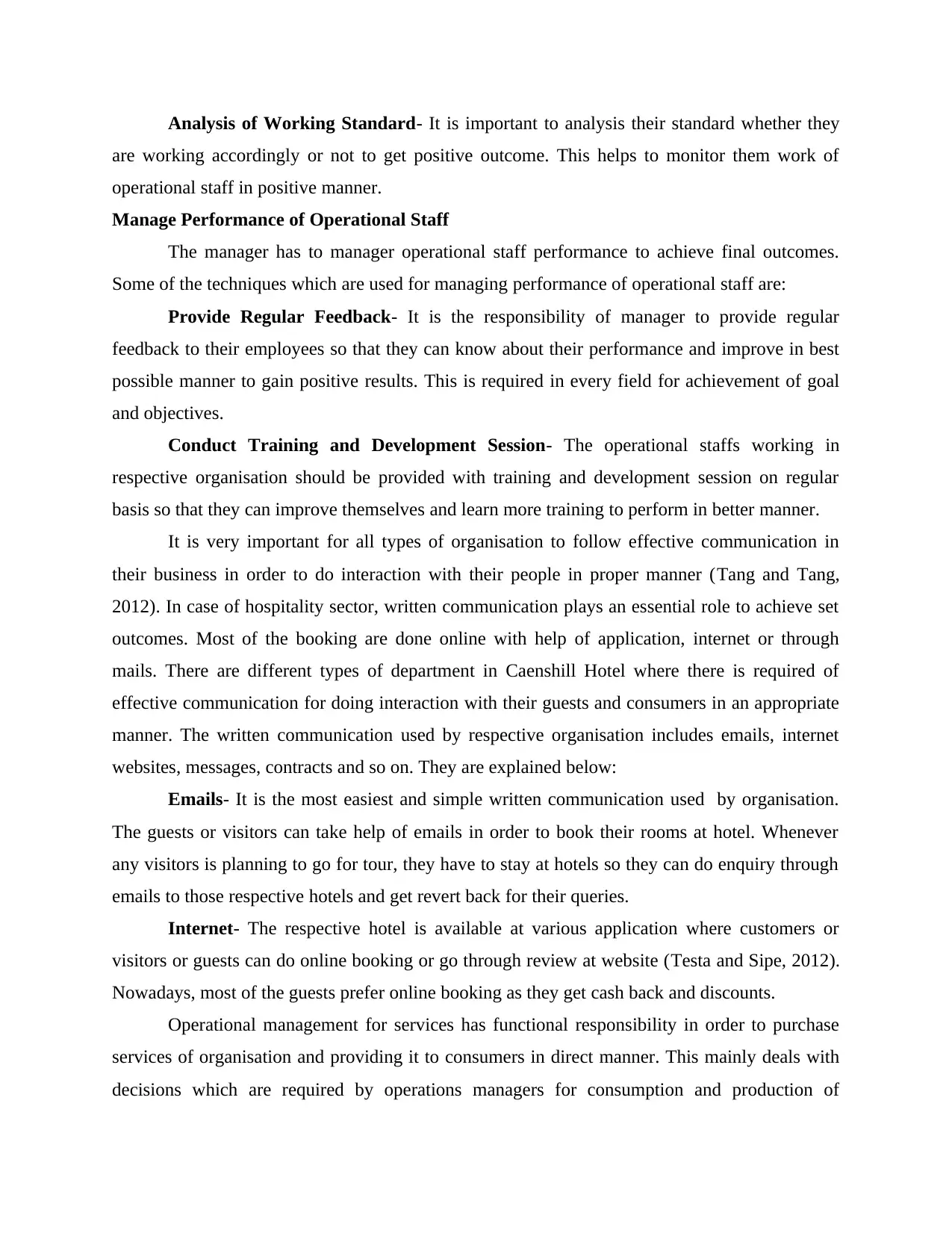
Analysis of Working Standard- It is important to analysis their standard whether they
are working accordingly or not to get positive outcome. This helps to monitor them work of
operational staff in positive manner.
Manage Performance of Operational Staff
The manager has to manager operational staff performance to achieve final outcomes.
Some of the techniques which are used for managing performance of operational staff are:
Provide Regular Feedback- It is the responsibility of manager to provide regular
feedback to their employees so that they can know about their performance and improve in best
possible manner to gain positive results. This is required in every field for achievement of goal
and objectives.
Conduct Training and Development Session- The operational staffs working in
respective organisation should be provided with training and development session on regular
basis so that they can improve themselves and learn more training to perform in better manner.
It is very important for all types of organisation to follow effective communication in
their business in order to do interaction with their people in proper manner (Tang and Tang,
2012). In case of hospitality sector, written communication plays an essential role to achieve set
outcomes. Most of the booking are done online with help of application, internet or through
mails. There are different types of department in Caenshill Hotel where there is required of
effective communication for doing interaction with their guests and consumers in an appropriate
manner. The written communication used by respective organisation includes emails, internet
websites, messages, contracts and so on. They are explained below:
Emails- It is the most easiest and simple written communication used by organisation.
The guests or visitors can take help of emails in order to book their rooms at hotel. Whenever
any visitors is planning to go for tour, they have to stay at hotels so they can do enquiry through
emails to those respective hotels and get revert back for their queries.
Internet- The respective hotel is available at various application where customers or
visitors or guests can do online booking or go through review at website (Testa and Sipe, 2012).
Nowadays, most of the guests prefer online booking as they get cash back and discounts.
Operational management for services has functional responsibility in order to purchase
services of organisation and providing it to consumers in direct manner. This mainly deals with
decisions which are required by operations managers for consumption and production of
are working accordingly or not to get positive outcome. This helps to monitor them work of
operational staff in positive manner.
Manage Performance of Operational Staff
The manager has to manager operational staff performance to achieve final outcomes.
Some of the techniques which are used for managing performance of operational staff are:
Provide Regular Feedback- It is the responsibility of manager to provide regular
feedback to their employees so that they can know about their performance and improve in best
possible manner to gain positive results. This is required in every field for achievement of goal
and objectives.
Conduct Training and Development Session- The operational staffs working in
respective organisation should be provided with training and development session on regular
basis so that they can improve themselves and learn more training to perform in better manner.
It is very important for all types of organisation to follow effective communication in
their business in order to do interaction with their people in proper manner (Tang and Tang,
2012). In case of hospitality sector, written communication plays an essential role to achieve set
outcomes. Most of the booking are done online with help of application, internet or through
mails. There are different types of department in Caenshill Hotel where there is required of
effective communication for doing interaction with their guests and consumers in an appropriate
manner. The written communication used by respective organisation includes emails, internet
websites, messages, contracts and so on. They are explained below:
Emails- It is the most easiest and simple written communication used by organisation.
The guests or visitors can take help of emails in order to book their rooms at hotel. Whenever
any visitors is planning to go for tour, they have to stay at hotels so they can do enquiry through
emails to those respective hotels and get revert back for their queries.
Internet- The respective hotel is available at various application where customers or
visitors or guests can do online booking or go through review at website (Testa and Sipe, 2012).
Nowadays, most of the guests prefer online booking as they get cash back and discounts.
Operational management for services has functional responsibility in order to purchase
services of organisation and providing it to consumers in direct manner. This mainly deals with
decisions which are required by operations managers for consumption and production of
⊘ This is a preview!⊘
Do you want full access?
Subscribe today to unlock all pages.

Trusted by 1+ million students worldwide
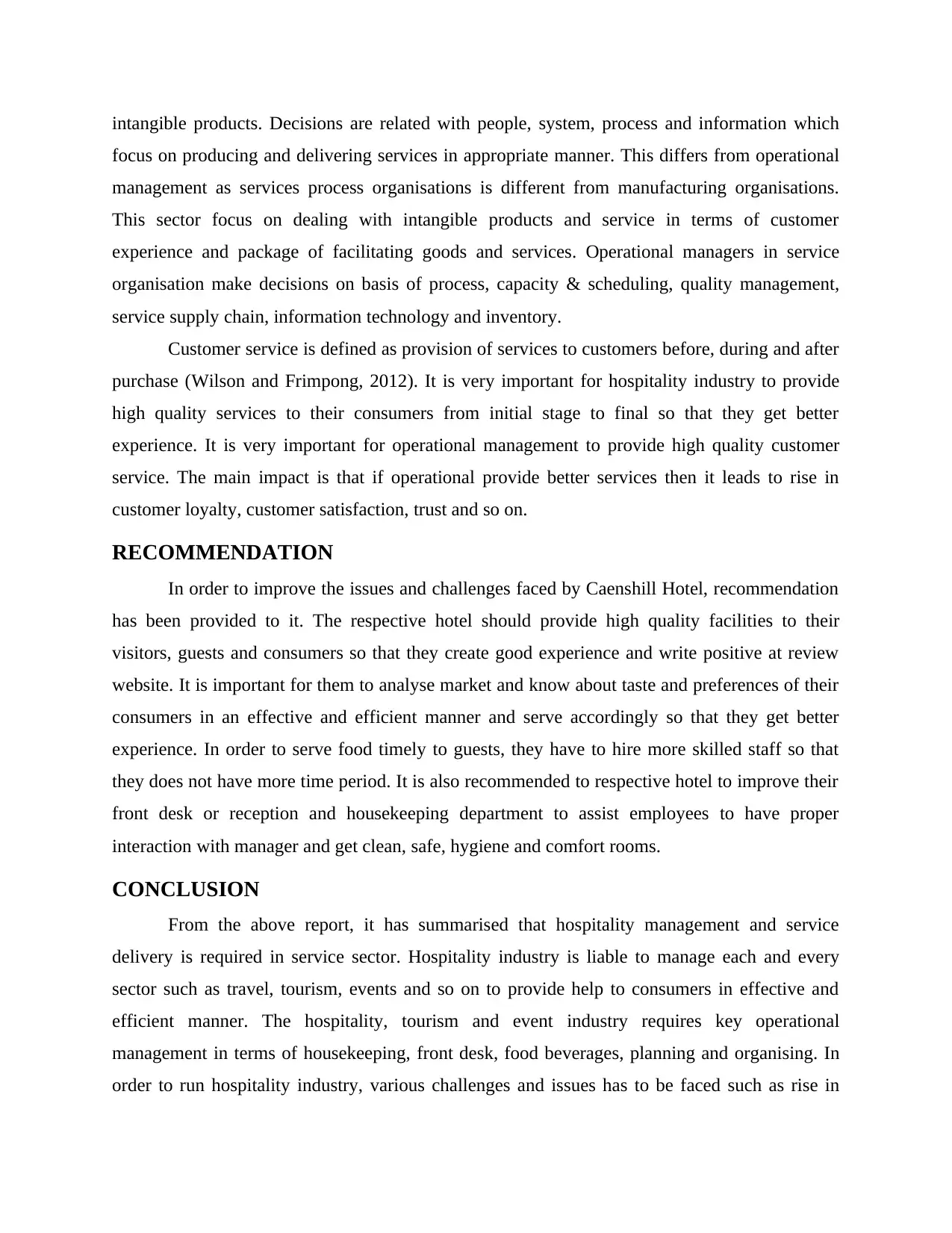
intangible products. Decisions are related with people, system, process and information which
focus on producing and delivering services in appropriate manner. This differs from operational
management as services process organisations is different from manufacturing organisations.
This sector focus on dealing with intangible products and service in terms of customer
experience and package of facilitating goods and services. Operational managers in service
organisation make decisions on basis of process, capacity & scheduling, quality management,
service supply chain, information technology and inventory.
Customer service is defined as provision of services to customers before, during and after
purchase (Wilson and Frimpong, 2012). It is very important for hospitality industry to provide
high quality services to their consumers from initial stage to final so that they get better
experience. It is very important for operational management to provide high quality customer
service. The main impact is that if operational provide better services then it leads to rise in
customer loyalty, customer satisfaction, trust and so on.
RECOMMENDATION
In order to improve the issues and challenges faced by Caenshill Hotel, recommendation
has been provided to it. The respective hotel should provide high quality facilities to their
visitors, guests and consumers so that they create good experience and write positive at review
website. It is important for them to analyse market and know about taste and preferences of their
consumers in an effective and efficient manner and serve accordingly so that they get better
experience. In order to serve food timely to guests, they have to hire more skilled staff so that
they does not have more time period. It is also recommended to respective hotel to improve their
front desk or reception and housekeeping department to assist employees to have proper
interaction with manager and get clean, safe, hygiene and comfort rooms.
CONCLUSION
From the above report, it has summarised that hospitality management and service
delivery is required in service sector. Hospitality industry is liable to manage each and every
sector such as travel, tourism, events and so on to provide help to consumers in effective and
efficient manner. The hospitality, tourism and event industry requires key operational
management in terms of housekeeping, front desk, food beverages, planning and organising. In
order to run hospitality industry, various challenges and issues has to be faced such as rise in
focus on producing and delivering services in appropriate manner. This differs from operational
management as services process organisations is different from manufacturing organisations.
This sector focus on dealing with intangible products and service in terms of customer
experience and package of facilitating goods and services. Operational managers in service
organisation make decisions on basis of process, capacity & scheduling, quality management,
service supply chain, information technology and inventory.
Customer service is defined as provision of services to customers before, during and after
purchase (Wilson and Frimpong, 2012). It is very important for hospitality industry to provide
high quality services to their consumers from initial stage to final so that they get better
experience. It is very important for operational management to provide high quality customer
service. The main impact is that if operational provide better services then it leads to rise in
customer loyalty, customer satisfaction, trust and so on.
RECOMMENDATION
In order to improve the issues and challenges faced by Caenshill Hotel, recommendation
has been provided to it. The respective hotel should provide high quality facilities to their
visitors, guests and consumers so that they create good experience and write positive at review
website. It is important for them to analyse market and know about taste and preferences of their
consumers in an effective and efficient manner and serve accordingly so that they get better
experience. In order to serve food timely to guests, they have to hire more skilled staff so that
they does not have more time period. It is also recommended to respective hotel to improve their
front desk or reception and housekeeping department to assist employees to have proper
interaction with manager and get clean, safe, hygiene and comfort rooms.
CONCLUSION
From the above report, it has summarised that hospitality management and service
delivery is required in service sector. Hospitality industry is liable to manage each and every
sector such as travel, tourism, events and so on to provide help to consumers in effective and
efficient manner. The hospitality, tourism and event industry requires key operational
management in terms of housekeeping, front desk, food beverages, planning and organising. In
order to run hospitality industry, various challenges and issues has to be faced such as rise in
Paraphrase This Document
Need a fresh take? Get an instant paraphrase of this document with our AI Paraphraser
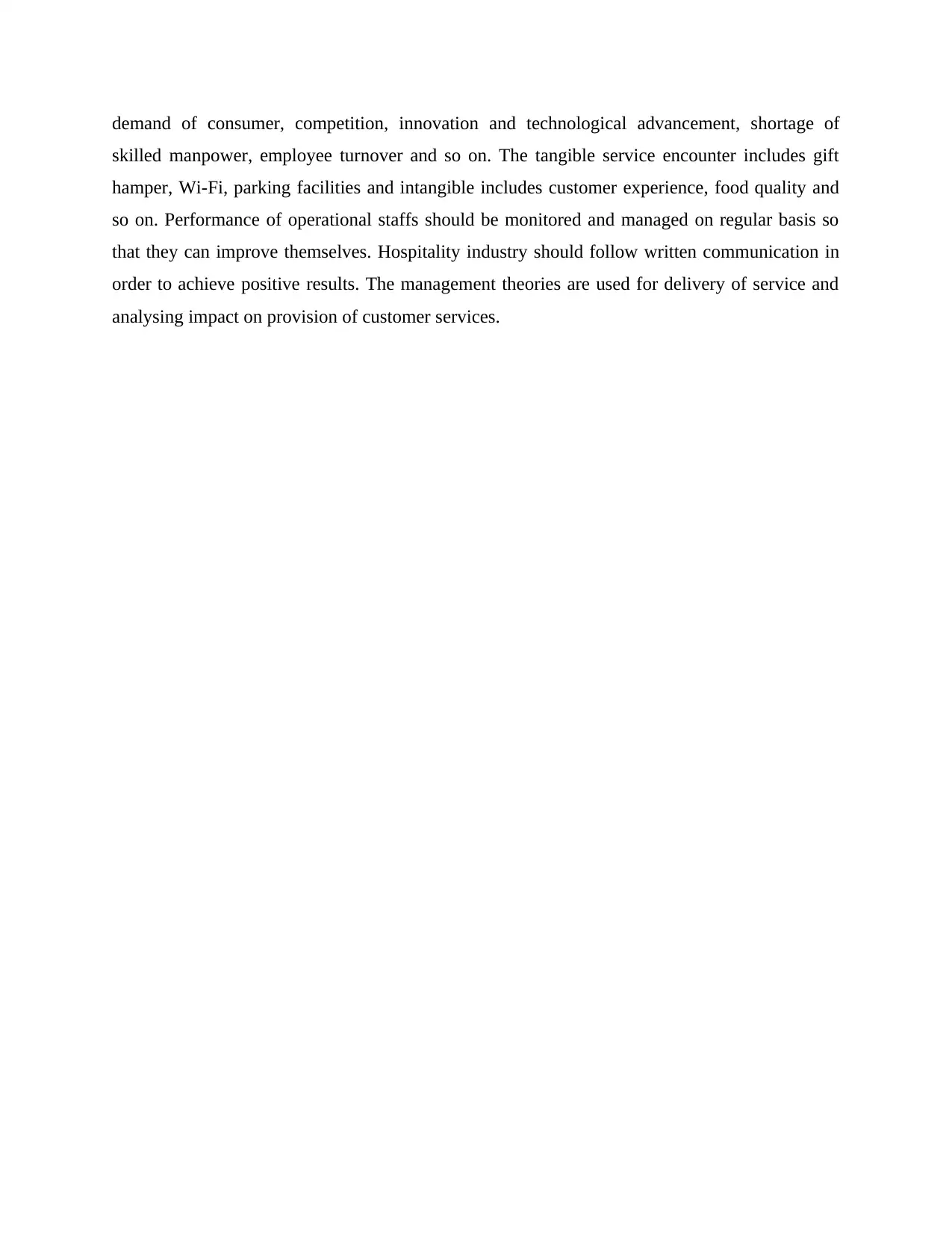
demand of consumer, competition, innovation and technological advancement, shortage of
skilled manpower, employee turnover and so on. The tangible service encounter includes gift
hamper, Wi-Fi, parking facilities and intangible includes customer experience, food quality and
so on. Performance of operational staffs should be monitored and managed on regular basis so
that they can improve themselves. Hospitality industry should follow written communication in
order to achieve positive results. The management theories are used for delivery of service and
analysing impact on provision of customer services.
skilled manpower, employee turnover and so on. The tangible service encounter includes gift
hamper, Wi-Fi, parking facilities and intangible includes customer experience, food quality and
so on. Performance of operational staffs should be monitored and managed on regular basis so
that they can improve themselves. Hospitality industry should follow written communication in
order to achieve positive results. The management theories are used for delivery of service and
analysing impact on provision of customer services.
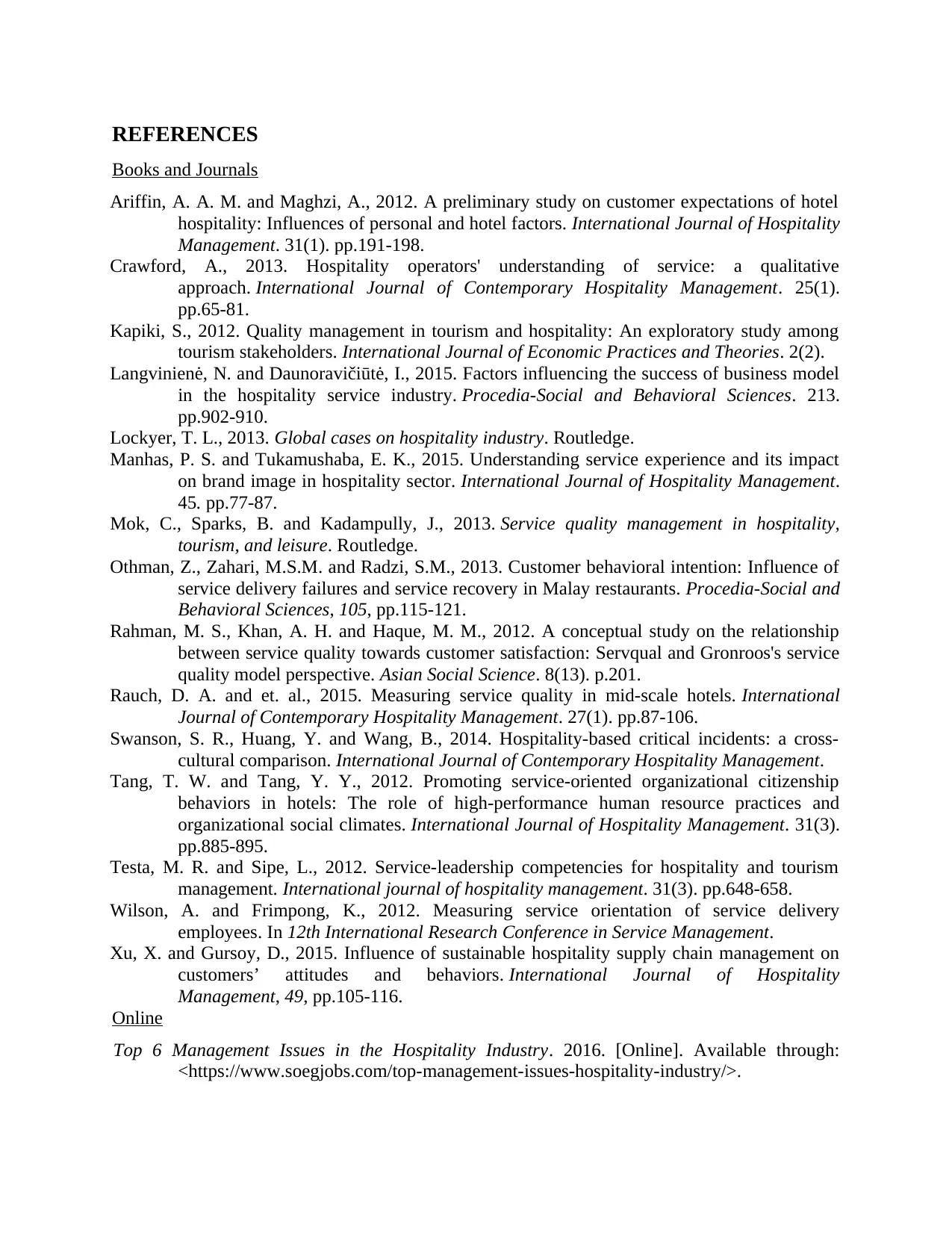
REFERENCES
Books and Journals
Ariffin, A. A. M. and Maghzi, A., 2012. A preliminary study on customer expectations of hotel
hospitality: Influences of personal and hotel factors. International Journal of Hospitality
Management. 31(1). pp.191-198.
Crawford, A., 2013. Hospitality operators' understanding of service: a qualitative
approach. International Journal of Contemporary Hospitality Management. 25(1).
pp.65-81.
Kapiki, S., 2012. Quality management in tourism and hospitality: An exploratory study among
tourism stakeholders. International Journal of Economic Practices and Theories. 2(2).
Langvinienė, N. and Daunoravičiūtė, I., 2015. Factors influencing the success of business model
in the hospitality service industry. Procedia-Social and Behavioral Sciences. 213.
pp.902-910.
Lockyer, T. L., 2013. Global cases on hospitality industry. Routledge.
Manhas, P. S. and Tukamushaba, E. K., 2015. Understanding service experience and its impact
on brand image in hospitality sector. International Journal of Hospitality Management.
45. pp.77-87.
Mok, C., Sparks, B. and Kadampully, J., 2013. Service quality management in hospitality,
tourism, and leisure. Routledge.
Othman, Z., Zahari, M.S.M. and Radzi, S.M., 2013. Customer behavioral intention: Influence of
service delivery failures and service recovery in Malay restaurants. Procedia-Social and
Behavioral Sciences, 105, pp.115-121.
Rahman, M. S., Khan, A. H. and Haque, M. M., 2012. A conceptual study on the relationship
between service quality towards customer satisfaction: Servqual and Gronroos's service
quality model perspective. Asian Social Science. 8(13). p.201.
Rauch, D. A. and et. al., 2015. Measuring service quality in mid-scale hotels. International
Journal of Contemporary Hospitality Management. 27(1). pp.87-106.
Swanson, S. R., Huang, Y. and Wang, B., 2014. Hospitality-based critical incidents: a cross-
cultural comparison. International Journal of Contemporary Hospitality Management.
Tang, T. W. and Tang, Y. Y., 2012. Promoting service-oriented organizational citizenship
behaviors in hotels: The role of high-performance human resource practices and
organizational social climates. International Journal of Hospitality Management. 31(3).
pp.885-895.
Testa, M. R. and Sipe, L., 2012. Service-leadership competencies for hospitality and tourism
management. International journal of hospitality management. 31(3). pp.648-658.
Wilson, A. and Frimpong, K., 2012. Measuring service orientation of service delivery
employees. In 12th International Research Conference in Service Management.
Xu, X. and Gursoy, D., 2015. Influence of sustainable hospitality supply chain management on
customers’ attitudes and behaviors. International Journal of Hospitality
Management, 49, pp.105-116.
Online
Top 6 Management Issues in the Hospitality Industry. 2016. [Online]. Available through:
<https://www.soegjobs.com/top-management-issues-hospitality-industry/>.
Books and Journals
Ariffin, A. A. M. and Maghzi, A., 2012. A preliminary study on customer expectations of hotel
hospitality: Influences of personal and hotel factors. International Journal of Hospitality
Management. 31(1). pp.191-198.
Crawford, A., 2013. Hospitality operators' understanding of service: a qualitative
approach. International Journal of Contemporary Hospitality Management. 25(1).
pp.65-81.
Kapiki, S., 2012. Quality management in tourism and hospitality: An exploratory study among
tourism stakeholders. International Journal of Economic Practices and Theories. 2(2).
Langvinienė, N. and Daunoravičiūtė, I., 2015. Factors influencing the success of business model
in the hospitality service industry. Procedia-Social and Behavioral Sciences. 213.
pp.902-910.
Lockyer, T. L., 2013. Global cases on hospitality industry. Routledge.
Manhas, P. S. and Tukamushaba, E. K., 2015. Understanding service experience and its impact
on brand image in hospitality sector. International Journal of Hospitality Management.
45. pp.77-87.
Mok, C., Sparks, B. and Kadampully, J., 2013. Service quality management in hospitality,
tourism, and leisure. Routledge.
Othman, Z., Zahari, M.S.M. and Radzi, S.M., 2013. Customer behavioral intention: Influence of
service delivery failures and service recovery in Malay restaurants. Procedia-Social and
Behavioral Sciences, 105, pp.115-121.
Rahman, M. S., Khan, A. H. and Haque, M. M., 2012. A conceptual study on the relationship
between service quality towards customer satisfaction: Servqual and Gronroos's service
quality model perspective. Asian Social Science. 8(13). p.201.
Rauch, D. A. and et. al., 2015. Measuring service quality in mid-scale hotels. International
Journal of Contemporary Hospitality Management. 27(1). pp.87-106.
Swanson, S. R., Huang, Y. and Wang, B., 2014. Hospitality-based critical incidents: a cross-
cultural comparison. International Journal of Contemporary Hospitality Management.
Tang, T. W. and Tang, Y. Y., 2012. Promoting service-oriented organizational citizenship
behaviors in hotels: The role of high-performance human resource practices and
organizational social climates. International Journal of Hospitality Management. 31(3).
pp.885-895.
Testa, M. R. and Sipe, L., 2012. Service-leadership competencies for hospitality and tourism
management. International journal of hospitality management. 31(3). pp.648-658.
Wilson, A. and Frimpong, K., 2012. Measuring service orientation of service delivery
employees. In 12th International Research Conference in Service Management.
Xu, X. and Gursoy, D., 2015. Influence of sustainable hospitality supply chain management on
customers’ attitudes and behaviors. International Journal of Hospitality
Management, 49, pp.105-116.
Online
Top 6 Management Issues in the Hospitality Industry. 2016. [Online]. Available through:
<https://www.soegjobs.com/top-management-issues-hospitality-industry/>.
⊘ This is a preview!⊘
Do you want full access?
Subscribe today to unlock all pages.

Trusted by 1+ million students worldwide
1 out of 14
Related Documents
Your All-in-One AI-Powered Toolkit for Academic Success.
+13062052269
info@desklib.com
Available 24*7 on WhatsApp / Email
![[object Object]](/_next/static/media/star-bottom.7253800d.svg)
Unlock your academic potential
Copyright © 2020–2026 A2Z Services. All Rights Reserved. Developed and managed by ZUCOL.





